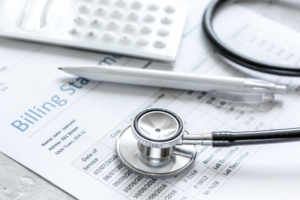
Benefits of Electronic Medical Records vs Paper | Pros & Cons
There are many advantages and disadvantages and paper versus electronic medical records. Find out why you should lean towards electronic records for your medical practice.

The use of electronic records is becoming more common in medical offices today, but some doctors are still opting for paper billing. One reason that was given by many physicians who maintain both types on their team and stick with it despite changing technology trends like this one? A need to reduce costs – since they can charge patients less when all transactions happen digitally instead! Here are some undeniable benefits of electronic medical records versus paper records.
With the introduction of EMRs, many professionals have seen a substantial improvement in how they work. However, not all practices are better off switching to electronic medical records (EMR). If you’re wondering whether your practice should make this transition or stay with paper methods- listen up!
Paper Medical Record Pros and Cons
Paper medical records are still in use by 5% of practices, but there’s an increasing number who choose them. For some doctors, this is their preferred option as they find it better than digital systems which can lose information or be hacked into by cybercriminals.

Paper based health care has been widespread for decades now and while its usage may decrease over time-it likely won’t go away completely just yet due to various factors including cost limitations with higher prices associated when transitioning from older technology equipment that does not offer current features needed today’s market place.
Going paperless may seem like the way of tomorrow, but there are still some benefits to using old-fashioned patient charts. It’s true that going digital can save time and money in your practice–especially when you’re just starting out or have decades under your belt! However, professionals recommend switching over because it will improve quality care for everyone involved with providing treatment at home
Pros/Advantages
- Save Money: The paper-based medical records system is a low-cost alternative to electronic health management (EHR) systems. Though it does not have the same features as EMRs, such as instant access and shared documentation across providers; this option still leads towards lower long-term retention costs because there’s no need for expensive software licenses or maintenance fees over time when you can just print new documents whenever needed.
- Ease of Use: Even for those who are used to creating and storing medical records on EMRs, there is still a lot of work that needs doing when it comes time to log into your system. The small learning curve can pose obstacles in such an urgent industry with so many deadline pressures from patients’ demanding requests!
- No Internet Required: Paper medical records offer a more reliable way of storing and accessing patient data than electronic ones. They’re also easier to update, which is especially helpful if there’s an emergency with your computer.
Cons/Disadvantages
- Storage Limitations: If you find yourself running out of space for your patient medical records, it’s time to consider whether or not they should be stored offsite. Storing them at a warehouse could create problems if there is ever an emergency situation where access needs rapidity.
- Track Edits: Medical records are constantly being updated and revised. It’s hard to make these amendments on paper without making the sheets messy or having too many copies of your record with different versions in each folder that will quickly become unmanageable-or worse yet, outdated. Rather than print out new ones every time there is an update though you can use our secure online system which updates all relevant information at once so it stays easy for everyone involved.
- Information Protection Security Concerns: Paper medical records can be destroyed in fires, natural disasters, or other catastrophes. The result is a loss of all your personal information with no backups left behind and physical locks being easier to breach than digital security infrastructure.
Electronic Medical Record Pros and Cons
EMRS are the digital equivalent of paperless medical records. They create an easy-to-use system for storing and accessing all your patient charts, with no need to sort through bulky folders at home or work! Your staff can also have remote access if they’re part of an electronic health record (EHR) which includes practice management tools – so you don’t miss out on any important information while away from clinic hours
The benefits associated with this type of environment make it worth considering as one possible solution when looking into how best to inform patients about their conditions.
Pros/Advantages
- Cloud Storage: While the size of your practice won’t limit how much data you can store, some EMR plans come with a preset amount that should be more than enough. If there are any problems when it comes to downloading or uploading files from our system because we’ve reached maximum capacity–just contact us and let’s discuss adding on extra cloud storage!
- Reduce or Eliminate Mistakes: With EMRs, you can enter patient records on your computer using either keyboards or voice commands. This makes the notes easier to read so that those involved in care will not misunderstand what was written down and make mistakes as a result of unclear information being recorded incorrectly onto paper forms used by hospitals across America today! Easier-to-read reproducible medical codes also stem from accurate coding practices which are made possible due largely thanks solely at least partly because patients aren’t forced into spending hours.
- Date and Time Stamping: Imagine being able to review a patient’s complete history with just one click. The EMR keeps track of all modifications and you can easily see what has been done in order, so that next time there is no confusion on how best to address your concern or question.
- Privacy and Security: The chances of a data breach are minimal when using an EMR platform that has been compliant with HIPAA. Plus, your electronic patient records won’t be destroyed in case the site where they’re stored gets damaged or even if their vendor experiences some form of mishap as well.
- Telehealth: With the introduction of new technology like mobile health (EHR) and e-prescribing tools, patients are able to have appointments remotely. This is especially helpful for those who may be mobility-limited or live far away from where they receive medical treatment; through telehealth services patients can take their required time off work without being concerned about traveling long distances on public transportation while also ensuring that any interactions between prescriptions will not cause harm if taken together as well.
Cons/Disadvantages
- Higher Prices: EMRs can be costly and require a lot of time to set up, but in the long run they save you money due to illegible charts. Plus EMs help facilitates better patient care by making things more streamlined for doctors who want that level of attention on every single case.
- Not Always User Friendly: When beginning to use an EMR, it’s important that your staff is able to learn the system quickly so they can provide quality care. Most vendors offer hands-on setup assistance and guided training for several months as you get accustomed to their systems; this will help ensure efficient patient management in advance of any major deadlines or events happening soon!
- Power and Internet Requirements: High-speed internet access is essential for practicing medicine. Without it, you’ll find yourself struggling to load the EMR system quickly enough so that you can get your work done and provide quality care as well! High bandwidth has been becoming increasingly rare in today’s world of the medical industry shift towards electronic records which makes investing time into improving this area worthwhile because faster loading speeds will allow clinicians an opportunity not only to see their patients’ information but also make more informed decisions about how they should treat them going forward – all within minutes instead hours or days previously requiring multiple clicks at minimum per page loads before being able even to start looking through what was just brought up on screen (if there were any errors).
A patient’s electronic health record (EHR) is a comprehensive history of their medical care that can be maintained by providers and contained all the relevant administrative data – from demographics, progress notes or problems they’re having with medications, etc., to vital signs like blood pressure measurements. It also has an ability for clinicians, not just to access but update this information as well! This helps streamline workflow which ultimately results in better quality service being provided overall. Find out what solution is right for you today. Get started below.
Author: Mike Cynar
Mike Cynar brings buyers and sellers together by producing reviews and creating non biased webpages allowing users to share their experiences on various products and services. He and his staff write informative articles related to the medical field, legal, and other small business industries.


Leave a Reply